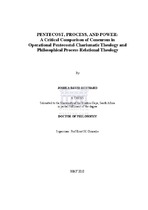| dc.description.abstract | This doctoral thesis comprises a critical comparison of the theme of concursus, the way in which God and humanity interact, in the Pentecostal-Charismatic and Process-Relational traditions. The comparison is literature-based; similarities and differences in the theological literature of each tradition are compared in order to determine the extent of compatibilities and incompatibilities. The hypothesis is that similarities in the literature sufficiently leverage differences. The first chapter includes a statement of the problem, namely that the global expansion of the Pentecostal-Charismatic movements necessitates interaction with more academically and philosophically oriented theological traditions such as Process- Relational theology. The second chapter comprises an historical survey of the Pentecostal-Charismatic movements, including key dogmas and practices. Chapter three comprises an historical survey of Process-Relational theology, including its philosophical, metaphysical, and scientific orientations. Seminal Process- Relational theists such as Whitehead, Hartshorne, and Cobb are surveyed. Chapter four consists of a broad historical survey of the theological theme of concursus, including the notions of causation, free will, and determinism in both philosophy and theology. Further, the fourth chapter includes a broad historical survey of pneumatology, which is framed as the basis for a comparison of concursus. Chapters five and six comprise surveys of concursus in the Pentecostal- Charismatic and Process-Relational traditions respectively. Chapter seven entails an extensive analysis of differences and synthesis of similarities between the Pentecostal-Charismatic and Process-Relational notions of concursus. Four differences and four similarities are identified. Differences and similarities are ranked and compared for compatibility. Ultimately, the research question is answered affirmatively and conditionally: yes, according to the literature of both traditions, similarities sufficiently leverage differences, but socio-linguistic barriers may obstruct meaningful mutual transformation. Chapter eight concludes with a brief exploration of ecclesial and social implications. | en_US |

